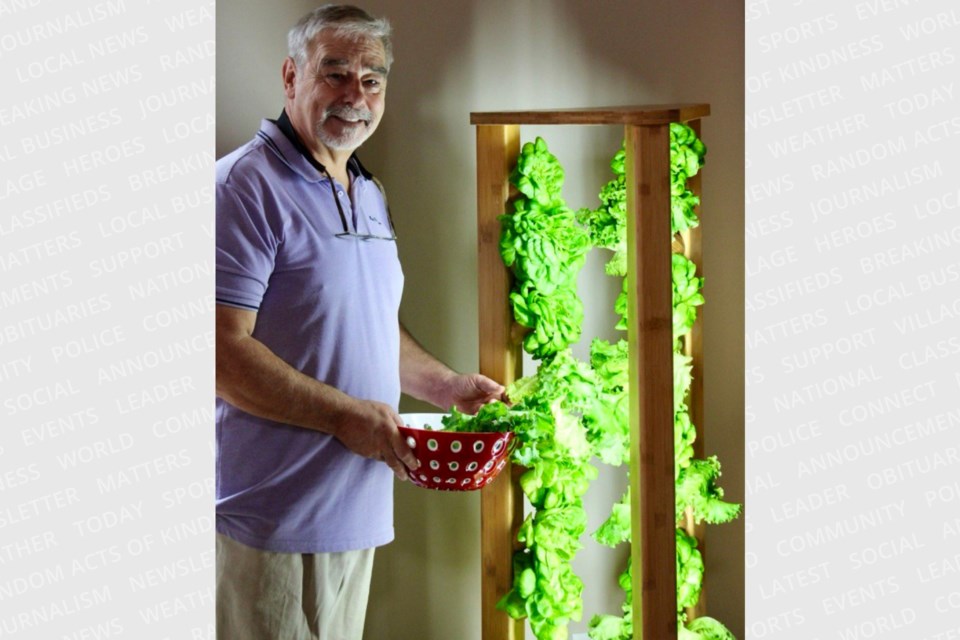The Eden Aeroponics Project seeks to help save the planet, ‘one bite at a time.'
The crowdfunding campaign to scale production of indoor aeroponic gardens, kicked-off last week with a goal to raise $100,000. The project aims to bring the future of home gardening into today's homes and shared community spaces.
With over 30 years of hydroponics expertise, Dan Atkinson, the founder of Eden Aeroponics in Puslinch, is dedicated to revolutionizing home gardening and in promoting sustainability.
Eden Aeroponics has developed The Eden and The Eboo indoor vertical aeroponic gardens, designed to empower individuals to grow fresh, hyper-local produce right in their living spaces, while reducing their carbon footprint.
“By backing the Eden Aeroponics Project on Indiegogo, you’re not just investing in a sustainable indoor gardening solution, you’re supporting a movement towards a more resilient future,” Atkinson said.
The Eden and The Eboo are crafted from sustainable and recyclable Bamboo. The indoor vertical aeroponic gardens not only produce crisp greens, but have successfully grown strawberries and herbs, all year round.
Atkinson said the Eden Aeroponics Project embodies sustainability, with a low carbon footprint, minimal operating costs and a promise to reduce reliance on traditional grocery store chains.
“I have been growing hydroponically for many years. Some people probably thought I was a bit of a ‘hippie.' But then after COVID-19, it seemed like everyone wanted to talk to me,” Atkinson said.
“With supply chain issues and all of the disruptions, things changed. So, we began to grow things like kale and various herbs in a contained vertical garden for our local customers.”
Atkinson said it was a huge wake up call for people, especially when it when it came to affordability and community sustainability.
“This is about growing lettuce and not having to pay so much for it,” Atkinson said. “We’ve also supported the Guelph Food Bank with kale, and we hope to work with Royal City Mission in the future. If these units could go into these places, they could grow their own produce, all year round.”
Atkinson and his wife have been growing and delivering produce on their Puslinch farm for a number of years.
“A couple Christmases ago, we delivered kale to one particular customer, but there was a big storm at the time. She said she couldn’t believe it. The mail man didn’t show up, the UPS man didn’t show up, but the kale guy showed up,” Atkinson said. “And so, I thought about how we can make something where we can grow fresh greens all year at home.”
After almost three years of prototyping and testing, Atkinson’s wife Lucy suggested the idea of a unit designed from bamboo.
“We looked around and we found this neat little company in Vietnam. Their vision lined up with ours in terms of sustainability, so we reached out to them,” Atkinson said. “Now, we have two prototypes here, ready to grow a lot of leafy greens."
Atkinson said there’s no competition in the soil with aeroponic gardens, no bugs, and produce grows about a third faster than it does outside.
“And you are recycling the water, so you are not hurting the environment. There is no runoff or pesticides,” he said.
“We’ve also grown strawberries and patio tomatoes. It’s the kind of production you want because you don’t have to harvest the whole plant. You can just pick the kale leaves or arugula off right off the plant. Leaf lettuce only takes about three weeks to grow, and you are eating it all the time because you are cutting it, not replacing it."
Atkinson said studies show that growing aeroponically provides all the nutrients, flavonoids and essential amino acids that soil plants have.
“In the old days we used to grow everything because people had big open spaces. Today, aeroponic gardens are ideal for apartments or condos,” he said.
Atkinson said indoor vertical aeroponic gardens can enhance any living space.
“It’s not an ugly plastic thing in the corner. It’s actually a nice piece of wooden furniture, an item that you could put in your kitchen or living room,” Atkinson said. "The average Canadian pays about $1,025 of greens every year. So, the machine really does pay for itself in eight months."
Joining the campaign offers access to discounted rates and, Atkinson said, the opportunity to directly contribute to community sustainability.
“We are excited to finally get it out into the world and make it available to the public,” Atkinson said. “This won’t solve the world’s problems, but it could help.”



